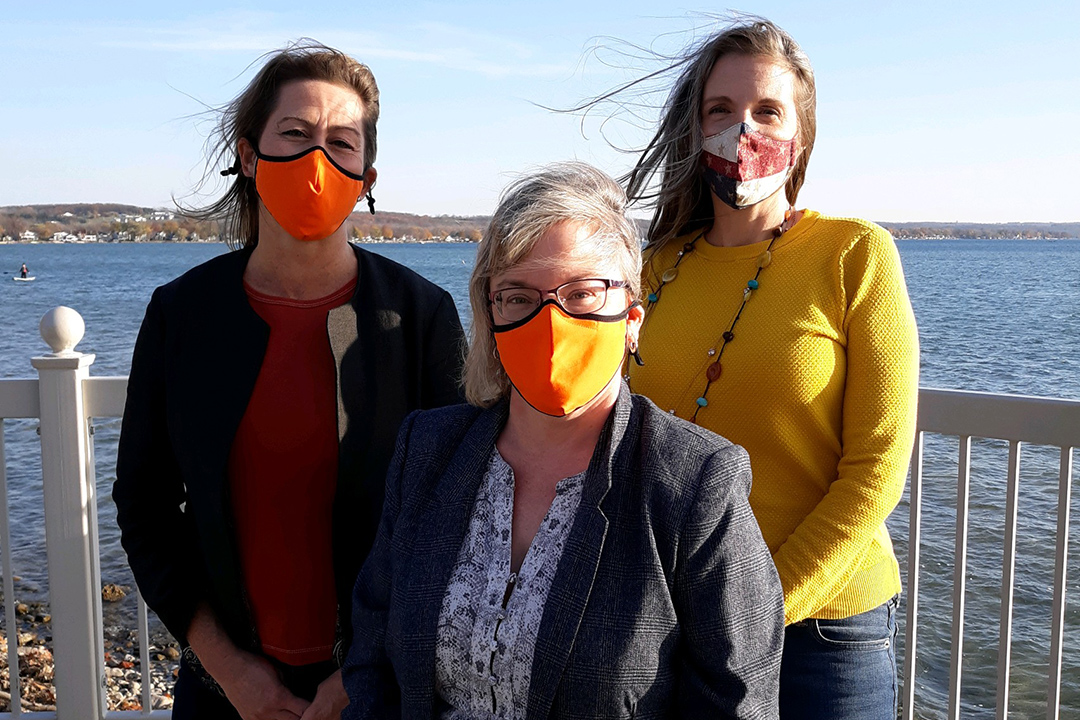RIT receives NIST grant to develop standards modules for Environmental Management and Safety curricula
Collaboration between RIT and FLCC will address risk, resilience, and business continuity during crisis situations
Lisa Greenwood and Jennifer Schneider, faculty in RIT’s Department of Civil Engineering Technology, Environmental Management and Safety, and Dawn Hess, director of Enterprise Risk Management and EHS at FLCC, will work together on a grant to develop standards modules for university students.
Rochester Institute of Technology recently received a grant to develop course modules that will provide students with guidelines and best practices in standards information toward helping organizations manage crisis situations.
The National Institute of Standards and Technology (NIST) awarded RIT funding to design standards educational modules that will be incorporated into graduate and undergraduate coursework at both RIT and Finger Lakes Community College (FLCC). Content will include topics on risk, resiliency, and business continuity, said Lisa Greenwood, principal investigator for the major project.
“We are seeing our environmental health and safety professionals playing a critical role in helping organizations to prepare for, and respond to, the global pandemic,” said Greenwood, assistant professor in the Department of Civil Engineering Technology, Environmental Management and Safety, in RIT’s College of Engineering Technology. “Through this curricular content, we will introduce our students to a range of national and international standards that deal with risk, disruption, and continuity. Our aim is to help students understand how to find the right information and use the right standards to integrate relevant pieces of those standards in their professional work as appropriate given particular crisis or disruption.”
Greenwood led several earlier projects at RIT, also funded by NIST, to incorporate standards education into current courses at the university. NIST, which is part of the U.S. Department of Commerce, advances measurement science and quality standards to improve industrial competitiveness and to also improve quality of life.
Content developed as part of this new grant is important to students who will work in professions where risk management and organizational and operational continuity are key to success. These strategies and guidelines are central to how organizations are managing the current pandemic and other disruptions.
“The new award exemplifies the growth of the standards practice into the curriculum at RIT and FLCC. It is an example of incorporating real-world experience into curricula as students will have been through a pandemic and can compare theory with practice,” said Dawn Hess, director of Enterprise Risk Management and EHS at FLCC.
“We are creating modules for graduate and undergraduate students, and those audiences are very different in what they bring to the learning environment,” Hess said. “When we look at just the beginning phases of the curricula, FEMA guidelines, for example, are straight-forward and start with an introduction of basic emergency management as well as risk concepts. They allow the user to gain operational definitions of the terms that will be used through the remainder of the course, and into their career.”
Modules will have the relevant elements applied at all levels of courses at CET and FLCC, including specialized courses at the graduate level. Work is underway and pilot programming is expected in the 2021 academic year, with full implementation expected by Fall 2022.
“Of the three projects funded in fiscal year 2020, this project is the only one focused on addressing the breadth of this critical subject matter. RIT and FLCC have a unique team with academic and organizational experience to deliver this,” said Jennifer Schneider, the Eugene H. Fram Chair of Applied Critical Thinking at RIT, professor in CET and principal of RIT’s Collaboratory for Resiliency & Recovery. She has worked with Greenwood on previous RIT standards curricula initiatives and, along with Hess, is co-PIs on the project team. Schneider and Hess have been instrumental in pandemic planning and response this year at their respective colleges. All three have industry experience in environmental management and safety.
Editor’s note: RIT and FLCC’s grant for “Capacity Building for Organizational Resilience: Standards-based Curriculum on Risk, Disruption and Continuity” also includes participation from Sam Samanta, FLCC professor, and Yewande Abraham, CET assistant professor.













